Chatter Marks
Chatter Marks is a podcast of the Anchorage Museum, dedicated to exploring Alaska’s identity through the creative and critical thinking of ideas—past, present and future. Featuring interviews with artists, presenters, staff and others associated with the Anchorage Museum and its mission.
Chatter Marks is a podcast of the Anchorage Museum, dedicated to exploring Alaska’s identity through the creative and critical thinking of ideas—past, present and future. Featuring interviews with artists, presenters, staff and others associated with the Anchorage Museum and its mission.
Episodes
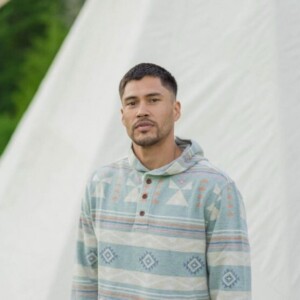
Friday Feb 03, 2023
EP 56 Creating new positive stereotypes with Martin Sensmeier
Friday Feb 03, 2023
Friday Feb 03, 2023
As a kid, Martin Sensmeier would daydream about being an actor. His older brother helped influence that dream. He had the first laserdisc player and the first flat screen TV in Yakutat, Alaska. So, Martin would go to his house to watch movies with him. He remembers it being such a special event. It was also special to see movies in the theater, but there wasn’t one in Yakutat. So, the only time he was able to go was when he went to Anchorage, Juneau or Fairbanks. His mom would drop him off at the theater in the morning and he’d watch movies all day long. For two or three days in a row, he’d watch every single movie in the theater and some of them he’d watch multiple times.
Growing up in Yakutat, Martin always wanted to play in the NBA or be an actor. It was always gonna be one of the two. The path to being a professional basketball player just involved so much coaching, travel and practicing around those who were also pursuing it at that level. So, acting won out, but it hasn’t been an easy road. Before he made the move to pursue acting, he worked in longshoring, in a logging camp, in construction, as a welder and on oil rigs. He was actually fired from his job in Prudhoe Bay, something he now considers to be a blessing in disguise. If he hadn’t been, he might still be up there waiting on an opportunity or the courage to leave and be an actor.
He pursues acting like he does everything in his life, like a warrior. He’s of Tlingit and Koyukon-Athabascan heritage and says that, in traditional Tlingit culture, young men started their warrior training at the age of seven. They learned how to test their bodies by training, running and hunting. He mentions one exercise where they would sit in the ocean and soak in cold water. Thinking about what it means to be a warrior today, he says it means being responsible, having good values and being an example of what it means to be a good person. This goes for how we treat each other too. Rather than getting caught up in divisiveness, we can break negative stereotypes by creating positive new ones.
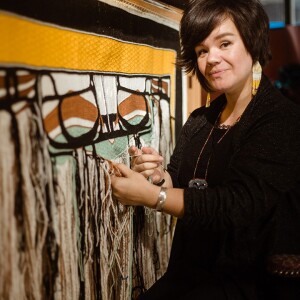
Sunday Jan 22, 2023
EP 55 Traditional Chilkat weaving with Lily Hope
Sunday Jan 22, 2023
Sunday Jan 22, 2023
Lily Hope is a traditional Chilkat Weaver from Juneau, Alaska. Both of her parents worked as full-time artists, so she grew up around the hustle of entrepreneurship and the responsibility of carrying on tradition. Her mom, Clarissa Rizal, learned how to weave from the late Master Chilkat Weaver, Jennie Thlunaut. Lily says that her mom probably felt the urgency of her own mortality, that it was imperative to teach her daughter the art of weaving because in the last 150 years there have been less than a dozen Chilkat ceremonial robe makers. So, Lily was introduced to it at 14 or 15 years old. It wasn’t a pleasurable experience though. Her mom pretty much forced her into it, making her weave rows and rows before she could do anything leisurely like hang out with friends. It was a chore, but it also turned out to be her calling.
Whether she’s weaving among a group or teaching others how to do it, she finds her happy place in human connection. When she’s with a group of other weavers, there’s commiserating, there’s camaraderie, there’s knowledge sharing. When she’s teaching, she’s passing on tradition and she’s helping her students understand techniques. Seeing them finally wrap their minds around the intricacies of a technique and implement it is one of her greatest joys.
Lily weaves ceremonial regalia for museums now. She says that her mom helped her understand and be comfortable with the idea. That they’ve been making these Chilkat blankets and robes for hundreds, if not thousands of years, and many of them live in museums. And, for right now, museums operate as incubators, taking care of these pieces and sharing their stories, until it’s time for them to be released back into the world.
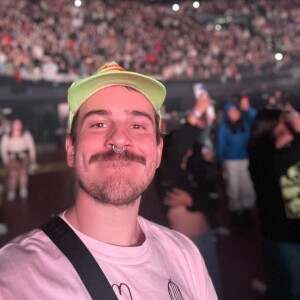
Tuesday Jan 10, 2023
EP 54 A fear of money and the pursuit of success with Nick Carpenter
Tuesday Jan 10, 2023
Tuesday Jan 10, 2023
Nick Carpenter, of the band Medium Build, grew up in a religious household, so the church and its teachings ruled everything. Money was important too, but he says it was always just out of their reach. So, in many ways, that resulted in them idolizing it because so many emotions were attached to it. Obsession, fear, paranoia, shame. It influenced their perception of themselves and others. This led Nick to his fear of money — that if he didn’t remain vigilant and aware of the pitfalls of wealth, it would consume him. So, he and his brother made a conscious effort to undo a lot of what they were taught and, in the process, figure out who they are without those teachings. Today, he and his parents have found understanding in their differences. They focus on connecting on the things they enjoy — food, music, playing board games. They stay honest with each other and they remind themselves that they’re stronger together.
When he was 8 years old, Nick started singing in front of hundreds, sometimes thousands, of people at his church. Then, when he was 15, he realized that he wanted to write and play his own music. He wrote a song and played it for a girl he had a crush on. She didn’t like him, but she liked the song. So, he knew he had an ability to entertain people and connect with them.
He says that his songs are his journal entries. Historically, they’ve been self-referential, but recently they’ve become more fictional. Many times borrowing from people and situations he observes. It all helps him process his life and the world around him. He wants it to be his career, to travel around the world singing his stories. But he says that if it all stopped — if his manager left him and no one booked him for shows anymore — he would still play music. Most likely he’d be at the open mics around Anchorage.
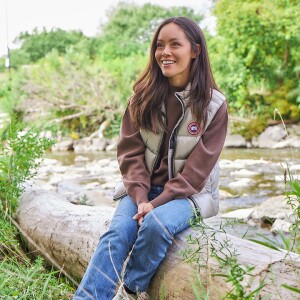
Friday Dec 30, 2022
Friday Dec 30, 2022
Nyla Innuksuk is an Indigenous director from Canada and she recently released Slash/Back, a horror / sci-fi movie about a group of Inuit girls who save their remote arctic community from an alien invasion. She says that the horror genre has always been a big part of her life. Her mom — being a fan as well — introduced it to her, actually. One day when Nyla and a friend were having a sleep over, her mom rented Alfred Hitchcock’s The Birds for them. They were 8 years old. That was the same year that Nyla and another friend would ride their bikes to the graveyard, they’d sit there and they’d write ghost stories. That’s how she spent most of her days until she was about 13 or 14. She lived in a town that was predominently Christian and realized that her love of witches and magic was probably not appropriate. But by then, she had moved onto writing scripts anyway.
Making Slash/Back was important to Nyla for a couple reasons. For one, she was able to film the script she’d been working on for years. It also helped her recover from a liver transplant. When she got the news about needing the tranplant, she was told that she had a 50/50 chance of surviving the month. It was a grim and scary situation, but she made it through the month and received a transplant in May of 2017. That September, she went to Nunavut and shot the proof of concept for the movie. She wasn’t wasting any time. Facing her mortality brought things intro focus and helped her recognize the things that she believes are really important in life. Friends, family and the relationships we build with them. It also helped her understand the importance of pursuing the things she wants in life.
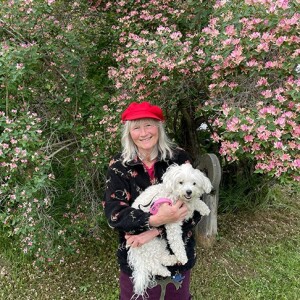
Saturday Dec 17, 2022
EP 52 If you take care of nature, it’ll take care of you with Mossy Kilcher
Saturday Dec 17, 2022
Saturday Dec 17, 2022
Mossy Kilcher is a homesteader, a musician and an ornithologist. When she was young, she was afraid of nature. It was just so big and there were so many ways to die. But the more time she spent outdoors, the better she understood it. Making music and recording bird songs helped. She realized that it wasn’t about taming the wilderness or dominating nature — like her father believed — it was about living in unison with it. That if you take care of it, it will be there for you when you inevitably need it. Understanding her place in nature, helped her understand her role in it. For example, she found that if she sat still for long enough, she became invisible and she could see and listen to nature doing its business all around her. It carried on without her help. She says that this was a sobering thought: that everything is important, not just her.
She recently released a book — a memoir — that focuses on her upbringing. Homesteading in Alaska before it was a state, living off the grid and off the land. They hunted and they gathered. It was a self-sufficient lifestyle that her father sought out and he found it in Alaska, a place where he believed he could live simply. They settled on land about 15 miles from the nearest town and accessible only by a trail in the forest or on the beach at low tide. They used horses and a wagon to transport goods back and forth. Mossy says that she wanted to share all of this because it’s what led her to another way of looking at life, another way of looking at the world. That everything matters and we need to be good, thoughtful stewards of the planet. It’s a connection with nature that she has applied to every aspect of her life.
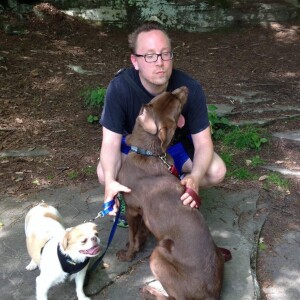
Wednesday Nov 30, 2022
EP 51 The Alaska punk scene with Josh Medsker
Wednesday Nov 30, 2022
Wednesday Nov 30, 2022
In the mid-90s and early 2000s, Josh Medsker documented the Alaska punk scene. He started out as a fan, attending as many shows as he could, and then he began documenting the scene. For about three years, he wrote for the University of Alaska Anchorage student paper, “The Northern Light,” the city’s alt-weekly, “The Anchorage Press,” and for his own publication, “Noise, Noise, Noise.” Articles, interviews, anything he could do to help tell the story of punk in Alaska. The scene was so vibrant and the energy was so infectious, that he felt a responsibility to capture as much as he could.
There were bands with names like Skate Death, Psychedelic Skeletons and Filipino Haircut. There were bands interested in the occult, bands interested in performance art, bands interested in making genuine punk music. There was even a band that lit themselves on fire. And they were all performing in venues and eventually warehouses. But for it to be sustainable, there needed to be the right mix of culture bearers and promoters. Bands that created the music, venues that hosted shows, an alt-weekly newspaper that promoted the shows, and a college radio station that played the music. It was a mixture that sometimes worked out and sometimes didn’t. When it worked out, the scene would flourish; when it didn’t, the scene would fade.
Josh looks back on that time as some of the happiest moments of his life. He remembers going into local music stores and buying local music. How special it was to buy a tape and listen to a local band, knowing that these musicians were walking the same streets that he walked. They understood his interests and his point of view.
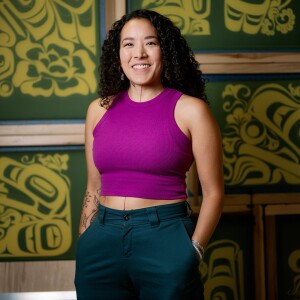
Friday Nov 18, 2022
EP 50 Indigenizing public spaces with Crystal Worl
Friday Nov 18, 2022
Friday Nov 18, 2022
Crystal Worl is fresh off of two big projects. A mural in downtown Anchorage and a commission for Google. The mural depicts and applies traditional Alaska Native traditions and symbols — the formline art of the Tlingit, Haida and Tsimshian, for example. It’s 120-feet long, the largest thing she’s ever designed. The Google skin, titled “Primary Ravens,” depicts ravens, which represent the Creator and are always playing tricks. What she likes most about these pieces is that they’re public. They don’t belong to just one person, they belong to the communities that they’re made for. So, anyone has access to them. Both designs utilize traditional and modern techniques, something Crystal makes a point of combining in her work, and they’re part of a larger idea to indigenize public spaces.
Crystal says that having her murals displayed downtown is significant because that’s where people come together. It’s where locals hang out, do business, have dinner, and it’s where visitors are often introduced to Alaska. In many ways, art helps us understand a city, the land and the history of both. She says that the art of formline can help us understand the future of Alaska. It can help us visualize and plan for the future of a state that reflects our ideals and our values. Her mentor, Haida artist Robert Davidson, taught her about the power of visualization. He told her to focus on the end goal, not the process because so many things will test your strength along the way, so it’s important to be persistent. To imagine herself standing in front of the finished piece and celebrating it.
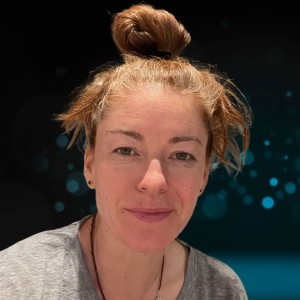
Tuesday Nov 01, 2022
EP 049 On roots, family and heritage with Priscilla Hensley
Tuesday Nov 01, 2022
Tuesday Nov 01, 2022
Priscilla Hensley is a writer and a documentarian. Before she started working on documentaries, her job history was varied — she had worked in communications and, having made a few short films herself, had some prior knowledge of filmmaking. There was also a period of time when she considered herself a poet. All these jobs have helped her to become a jack-of-all-trades. Her time in communications has helped a lot with her documentary work because so much of filmmaking is about logistics and making things happen. Her poetry has helped with her screenwriting. She says that the most important thing she’s learned about screenwriting is to start. Just put the story on paper. You don’t need to have great spelling, you can drop words, and you don’t need to storyboard everything. Just start writing. And then, later, you can worry about editing and rewriting.
Priscilla grew up recognizing and honoring her Inupiaq heritage. Her dad, William Hensley, is a key figure in Alaska Native land rights. He’s known for his role in the creation of the Alaska Native Claims Settlement Act. As a result of the act, Alaska Natives retained 44 million acres of land and about 1 billion dollars to settle Indigenous land claims in Alaska. Growing up around all of this is a big reason she pursues telling the stories that she does. The first documentary she worked on, for example, was “We Up,” a film about Indigenous hip hop of the circumpolar North. It was produced by the Anchorage Museum. In addition to it being a family affair — her husband also worked on the film and their children tagged along — it introduced her to the power of filmmaking.
Priscilla has tattoos that commemorate her roots and her heritage. She gets them with her cousin every time she goes back to Alaska. The most recent one is on her hand, so she sees it when she’s writing or operating a camera. She says that she loves seeing her tattoos when she works because they’re a visual reminder of who she is, how she wants the world to see her, and her responsibility to being true to herself, her family and her community.


